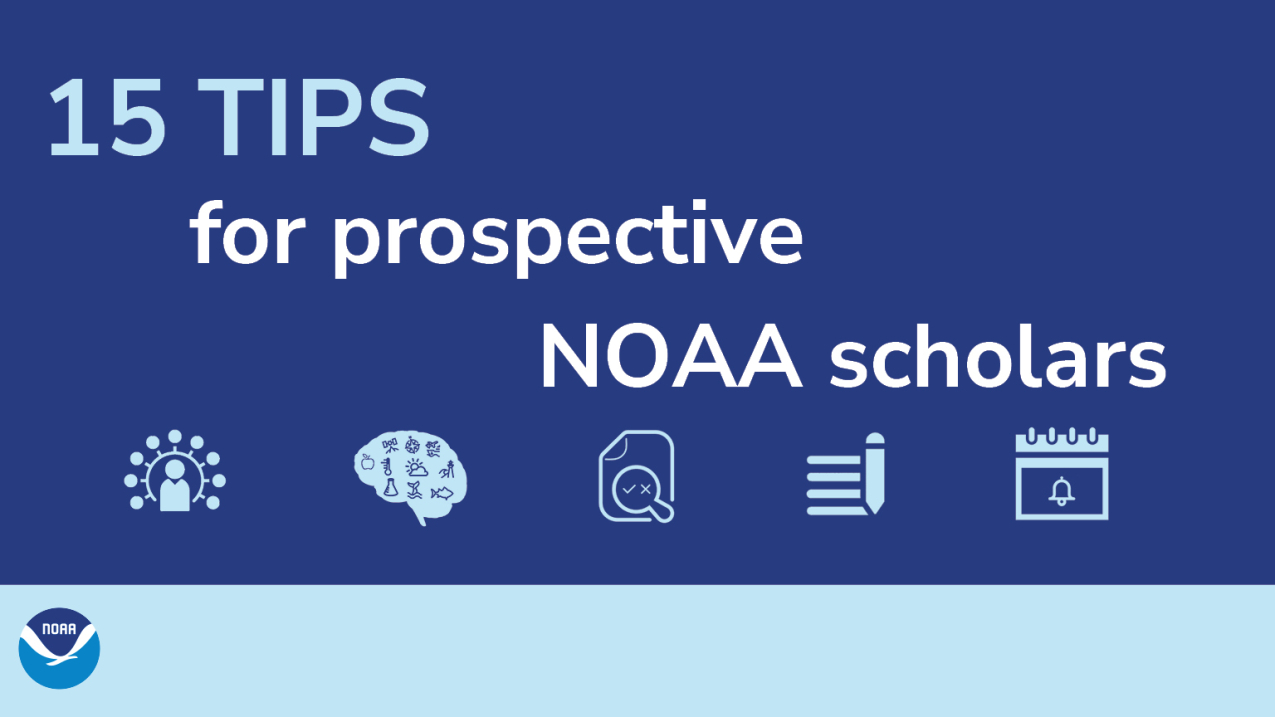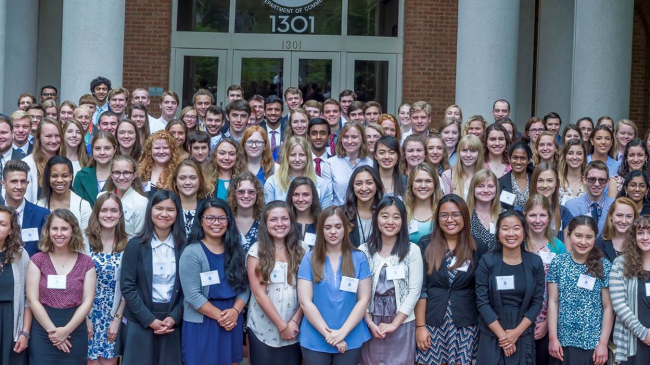Each year from September through January, rising sophomores can apply for NOAA's Educational Partnership Program with Minority Serving Institutions (EPP/MSI) and Ernest F. Hollings undergraduate scholarships. These programs give students the opportunity to come to NOAA for internships and provide financial support. We asked some of our undergraduate scholarship application reviewers to share their tips on what makes a great application. Whether you are planning to apply this year or preparing for the future, check out their advice to build an application that showcases your strengths.

15 tips for prospective NOAA Scholars (Image credit: Office of Education)
Jump to:
Before starting your application
While preparing your application
After preparing your application
Before starting your application
Building a strong application starts with building a strong resume and organizing your thoughts. This section will be most helpful for those who plan to apply next year, but don’t skip it if you are applying this year! Use these tips to help you decide which experiences to put in your application.
1. Seek out opportunities.
Showing initiative and pursuing opportunities before preparing an application is key. These experiences can range from participating in clubs, volunteering in a lab, taking a course with a large research component, working in your community, tutoring, career shadowing, or on-the-job leadership.
2. Communicate with your instructors.
Make an effort to stand out to your instructors. If they are aware of your interests and see you as an individual, they will be more likely to keep you up-to-date on opportunities, provide resources, and, eventually, write a strong letter of recommendation. Actively participating in class and visiting office hours are two good ways to get to know your instructors.
3. Join clubs and professional societies.
Participating in clubs or professional societies, such as the American Fisheries Society offsite link, American Meteorological Society offsite link, or American Geophysical Union offsite link, is not only a way to build a network, but can also help you discover new career paths and show your interest in NOAA fields. Many professional societies and associated conferences are free or have reduced fees for student members.
4. Get to know NOAA.
Check out the NOAA website to learn more about NOAA’s mission and the different types of work NOAA does. Once you find some topics of interest, explore the appropriate web pages and start following them on social media. Most NOAA offices have social media accounts that they update regularly.
5. Practice your “elevator pitch.”
An elevator pitch is a short speech about yourself and your career goals that you could give to a stranger you meet (in an elevator, for example). You should vary your speech by the audience you are talking to — a scientist in a different field, the same field, or someone who does not have a background in your field at all. Getting your pitch down will help you identify what makes you unique and concisely describe your career goals, which will be useful as you write your “statement of career essay” (and for EPP/MSI applicants — your interview).
While preparing your application
You have probably already visited the web pages for prospective EPP/MSI and prospective Hollings undergraduate scholars and looked at EPP/MSI application evaluation criteria and Hollings application evaluation criteria, but what else should you keep in mind?
1. Start early.
Starting your application as early as you can is important. You will need time to gather information, secure your transcript and references, respond to the essay questions, and proofread your application … and proofread it again … and give it to everyone you know to proofread. See our Preparing to apply to the EPP/MSI and Hollings scholarship for a sample application and evaluation materials.
2. Promote yourself.
Talking yourself up can feel awkward, but it is an essential part of creating a strong application. If you are struggling, talk to someone who knows you well and ask them why they think you are a good candidate for this program. Incorporate those things into your statement of career essay and education plan, and use it to help you identify other relevant experiences.
3. Find the value in your experiences.
Almost every opportunity you take develops an important skill even if the experience is not related to NOAA’s mission. For example, customer service teaches task management and how to creatively solve problems, holding a position in a high school or college club shows leadership, being a manager develops leadership and planning skills. How do you take initiative, innovate, or go above and beyond getting good grades? Did you do a high school senior thesis or an extended study for a class that taught research and project management skills?
4. Don’t repeat your resume in the essay.
The essay accounts for 60% of your score and is one of the best places to make your application stand out, along with your references. Essays give you the opportunity to put your experiences into context: Who are you as a person? What is your story? Why do your experiences make you a good candidate for the program? What makes you a good candidate that can’t be found in a list of experiences and classes?
5. Explain why you are interested in a NOAA opportunity.
When responding to the essay questions, be sure to make a connection with NOAA. Reviewers can tell when an applicant doesn’t know NOAA’s mission or work. You should explain why you are applying for a NOAA program, specifically. Explain why NOAA’s mission of science, service, and stewardship resonates with you, and how an internship at NOAA will help you reach your goals.
After preparing your application
Don’t hit that submit button just yet! There are a few more things you can do to make sure your application is in good shape. And, even once you do submit, the work of creating a strong application isn’t necessarily done. The tips below will help you put those finishing touches on your application and ensure a strong application before, and after, submission.
1. Proofread and use your institution’s resources.
Having misspellings and grammatical errors is a common mistake in applications. Proofread your own application, but keep in mind that fresh eyes are better at catching mistakes and spotting ways to improve your writing, so have as many people read your application as possible. Ask around to see what resources your institution offers like a scholarship office or career center. One trick to evaluate your writing is to outline your essay responses after you have finished them. This can help you find areas to improve the order or flow of your responses.
2. Choose your references thoughtfully.
The references you provide on your application will be sent a form which is used to submit an endorsement statement (i.e. a letter of recommendation). Choosing references based on how impressive their titles sound can be tempting, but you are better off choosing someone who knows you well. Because many applicants have not had much prior research experience, the letters of recommendation play an important role — your references should be able to speak to your skills, interests, and drive in a genuine and specific way.
3. Provide your references with context and prompts.
If you provide your references with information, you make it easier for them to write you a meaningful and unique letter. Give them information about the scholarship, provide them with your resume, tell them why you are interested in the program specifically, and tell them what you think makes you a good applicant.
4. Check in with your references.
Instructors and other mentors are often asked to write many letters of recommendation around the same time. Most of them appreciate polite reminders along the way and as deadlines approach. It doesn’t hurt to ask them whether they mind getting an occasional reminder from you (they will probably say, “please do!”).
5. Keep your grades up and seek new opportunities.
Keep in mind that your GPA must stay above the scholarship requirement (3.2 for EPP/MSI, 3.0 for Hollings) at the time of award and throughout the scholarship. You should also continue to seek new opportunities. New experiences will help you decide on, and interview well for, an EPP/MSI or Hollings undergraduate internship if you receive the award.
Good luck with your application! By following these tips, you should be able to develop a strong application that highlights what makes you a great scholarship candidate.


